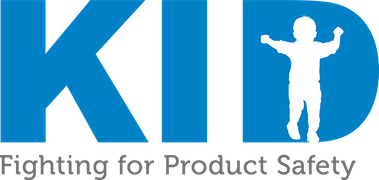
The US Consumer Product Safety Commission or CPSC is at the helm of children’s product safety. Here’s a quick update of recent and upcoming activity.
Update: CPSC adopts new mandatory infant bedside sleeper standard.
KID’s view: In keeping with the timeline set by Danny’s Law in developing and publishing strong mandatory standards for durable infant and toddler products. To date, 9 product standards have been published and two more have been approved, but not published. Most recent is a standard for infant bedside sleepers. The new standard addresses suffocation and entrapment hazards and requires compliance with the bassinet or play yard standard if the product can also be used in those ways. KID still has some concerns about the attachment to an adult bed – there are so many possible types of beds and misassembly of the attachment could lead to a gap where a baby could be entrapped. But this standard does address the known incidents in this type of product. Learn more.
Update: CPSC considers revisions to Section 6(B)
KID’s view: One of the long standing concerns with safety at CPSC has to do with Section 6(b) of the Consumer Product Safety Act. This rule requires CPSC to give notice to a company prior to releasing safety information about products. CPSC is the only public regulatory agency that has such a restriction. Attempts to remove the section during negotiations for the 2008 Consumer Product Safety Improvement Act were unsuccessful although minor changes now allow quicker turnaround of information. Congress also added a provision that created the SaferProducts.gov database, increasing access to information on product hazards. Now, CPSC is considering changes to make it easier to respond to requests for information. Changes include making it clear that information such as newsletter articles or other previously released information can be shared without asking permission and addressing the vast changes in technology that have come about since the rule was written. KID strongly supports these changes and will be submitting comments if the rule is adopted and subject to a comment period. We will keep you informed.
Update: CPSC is accepting public comments on plans to require certain actions in voluntary recalls
KID’s view: In the 2008 CPSIA, requirements for mandatory recall notices were included that would ensure companies do all they can to notify users of the recalled product and ensure compliance. But almost all recalls are voluntary, so the requirements rarely apply. Now CPSC has developed requirements for voluntary recalls that will assure each recall is as effective as possible. These include using social media and internet postings; clearly identifying the product and requiring direct contact where contact information is available. KID strongly supports these new required actions. In addition we support making the recall agreement legally binding. Companies should not be able to say they will do one thing and then not live up to that agreement. These changes will put teeth in a system that is too often left to the goodwill of companies. Comments on the proposed changes are accepted through February 4. We urge you to add your voice to this debate, especially if you have had experience with a recalled product and wish more had been done to alert you to the recall.


2 Comments
Pam Borchardt
Congratulations! This is excellent.
Wonia
Lydia Denworth, who is the author of a book about the hiosrty of the battle for lead regulation in the U.S., weighed in on the CPSIA debate on Beacon Broadside today. I hope you'll come by and check it out:Jessie Bennett, Blog Editor, Beacon Broadside